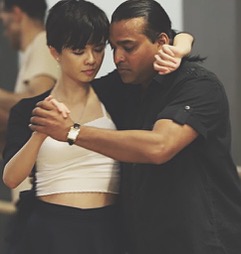When we were locked down in the early months of the pandemic, my dancing—a refuge from the daily grind and a welcome distraction from my research—was taken away from me. I missed (and still miss) going to the studio every Saturday afternoon. In a ballet class, you dance alone but never in solitude. At the barre, everyone does the same tendus and glissés to warm up, and the exercises sometimes take on the quality of collective meditation. During grand allegro, the final exhilarating section of every class, you may be flying through the air in a grand jeté, but you are constantly aware of those around you so as to not throw yourself inexpertly and inelegantly into their path.
In a milonga, a social event where improvised Argentine tango is danced, there is a wonderfully paradoxical element to how the dance’s characteristic abrazo (embrace) creates an intensely private world of only two. A memorable tanda (a set of three or four songs) is not characterised by the kind of fancy footwork one might see on a Strictly episode or in tango escenario (stage tango), but the quality of how you have embraced your partner and how they have embraced you. The abrazo is what makes improvisation possible between strangers who are dancing together for the first time: two people, cheek-to-cheek and chest-to-chest, speaking wordlessly to each other and for each other. You are, of course, also sharing the same space with other pairs: social Argentine tango is danced in a ronda, concentric rings of couples moving in the same direction around the dance floor. I’ve often thought about how a ronda resembles a planetary system when viewed from above: each pair moving in their own embrace, responding to the push-and-pull of other bodies, but always alone with each other, in their own little orbit.

When we were locked down, all of this went away. Two new jobs and two international relocations later, dancing feels like a dream from a past life now that I can no longer imagine the feeling of meeting someone in an abrazo for the first time or the thrill of taking flight in the last ten minutes of a ballet class. I have lived alone for a while, but after these recent upheavals, solitude has taken on a different sheen, especially with friends scattered across different cities and family more than 6500 miles away. As if to mimic the presence of other people, I recently found myself revisiting languages I know and picking up new ones. Thinking in a language other than English and fumbling with unfamiliar sounds seemed to make my own voice foreign and new, helping to fill the emptiness of a studio flat that isn’t big to begin with. When I learn a new word or a phrase, I sometimes translate it into all the languages I’m learning, just to talk to myself in different ways. When I try to think in another language that is not my first, I give myself an interlocutor, a voice that is both me and not-me, and in my solitude, when days begin to bleed into each other with no discernible edge, it gives me new awareness of myself, what I feel, and what I think about.
Take for example what I learnt today. In Korean, the expression for ‘I miss you’ — ‘보고 싶다’ — translates literally to ‘want to see [you]’, and so to miss someone is to desire the sight of them, just as I desire to see my mother again. The Mandarin Chinese expression for ‘I miss you’ is ‘我想念你’. It literally translates to ‘I am thinking thoughts of you’, but when my paternal grandmother tells me she misses me in Cantonese, she drops the noun and adds an intensifier to say ‘I think about you often’, ‘我很想你’. Like Mandarin Chinese, verbs in Cantonese don’t take tense conjugations, so in a way she’s saying that she’s thinking of me in the past, present, and future, just as I am thinking of her endlessly. When rendered literally, the French phrase ‘tu me manques’ means ‘you are lacking from me’, with the main pronoun foregrounding the one who is missed, rather than the person doing the missing. I used to apply this phrase in romantic contexts, but now I think about my maternal grandmother, her passing this summer, and how she is lacking from me in a place I cannot reach, a constant presence in her absence.
Like the French, the Spanish ‘te extraño’ foregrounds its object. Virtually all of my knowledge of Spanish is borrowed from tango music and I cannot untangle the language from its melodies. In Raul Iriarte and Miguel Caló’s rendition of Cada día te extraño más, Iriarte sings ‘every day I miss you more’ over the bandoneon of Caló’s orquesta, and I think about what my feet would do to mark the piano at the end of the phrase. Dancing alone is not quite the same. Translated literally, the Spanish ‘me falta haces’ also means ‘I need you’, and Caló’s orquesta plays for me again. I remember the exquisite violin running through Que falta que me hacés and how in the last verse, Alberto Podestá sings that if he finds his beloved, they will be ‘desesperadamente, los dos para los dos’—desperately, both of us for us. I think about how I’ve danced to this tango in London, Warsaw, Belgrade, and Lisbon, and wonder when I will see those places again.
It will be a while until my next flight (home; in the dance studio) and my next embrace (of my loved ones; a fellow dancer). But in my solitude, I’m learning to befriend and live with these versions of me, who articulate things about myself that I ordinarily wouldn’t. 보고 싶어요. 我很想你. Tu me manques. Te extraño.
Vanessa Lim (@vanessaolim) is a literary and intellectual historian of early modern England, with a special interest in the reception and use of classical rhetoric in the Renaissance.